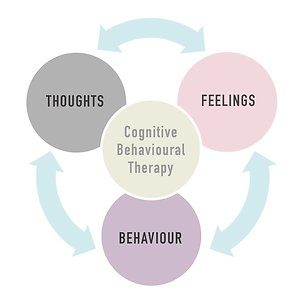How Cognitive Behavioural Therapy works
What is cognitive behavioural therapy – or CBT as it’s commonly known? It is talking therapy, developed in the ’60s by Dr. Aaron Beck, initially for the treatment of depression but research has shown over the years that it is highly effective for many areas of mental health and psychological wellbeing.
A lot of people think that CBT is ‘just’ about turning negative thoughts into positive thoughts. This element is just one part of a complex but often life-changing therapy process.
The key concept is that your thoughts, feelings, physical sensations and behaviours are all interconnected and can trap you into a vicious cycle. CBT helps you to break this cycle and to deal with overwhelming problems in a more positive way.

Diagram of what’s called the CBT Model – developed by American psychiatrist Dr Aaron Beck
Many of us go through life on autopilot not giving our minds much thought but our minds are one of our most important assets just like we do with our physical health we need to give our minds some time and attention.
First Steps in CBT therapy
The first steps in CBT are to help you become more aware of how your mind works, identify the key areas you are struggling with or what you want to understand more and set some goals for what you want to get out of your therapy sessions.
It is a practical and collaborative type of therapy, which helps you to manage your problems by changing the way you think, feel and behave. CBT helps you find practical ways and strategies to improve your psychological well-being daily so you can be the best version of yourself.
CBT focuses on improving things in the here and now. It doesn’t focus too much on issues from your past, although sometimes our current difficulties do stem from previous events, which then need to be discussed.
Think about a recent problem you have experienced and then consider the above model, what were your thoughts, feelings and behaviours and how helpful were they?
Now take a moment to consider what you are like when you are at your very best without fear or anxiety and now consider the model again does it look different?
Importantly, CBT is grounded in a huge amount of science and research. This means that the techniques used by your therapist have been scientifically tried and tested.
CBT therapists, like myself, are highly trained and well equipped to work with clients who have a full range of anxiety disorders, mood difficulties and many other psychological issues. Sessions are more active generally compared with other types of therapies. This is because the therapeutic relationship is based on the individual is an expert in their experiences and the therapist being an expert in CBT and bringing these two elements together to solve problems and move forwards. It’s very collaborative and we work together to help you reach your therapeutic goal.
CBT sessions contain a lot of education about how the mind works, psychology and different areas of mental health. Ultimately CBT therapy will help you to learn and develop the knowledge and skills needed to become your therapist and make changes for life.